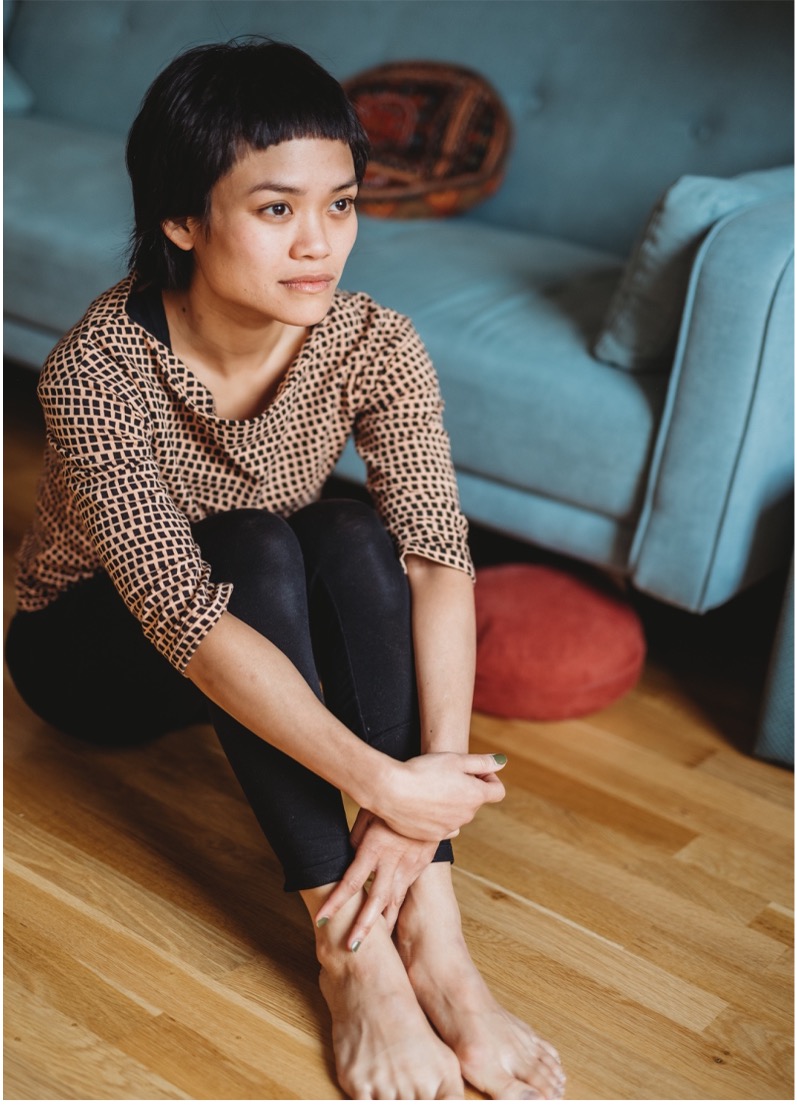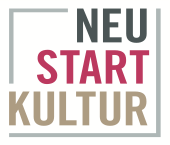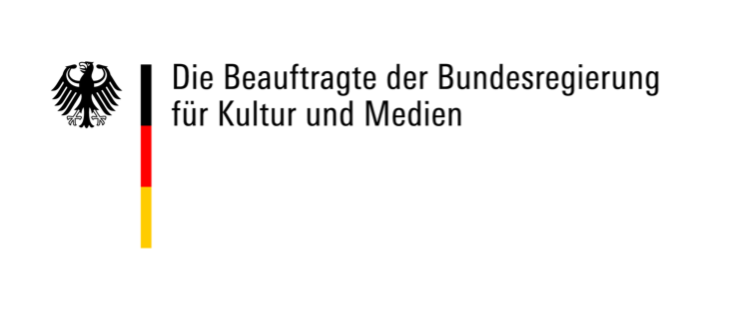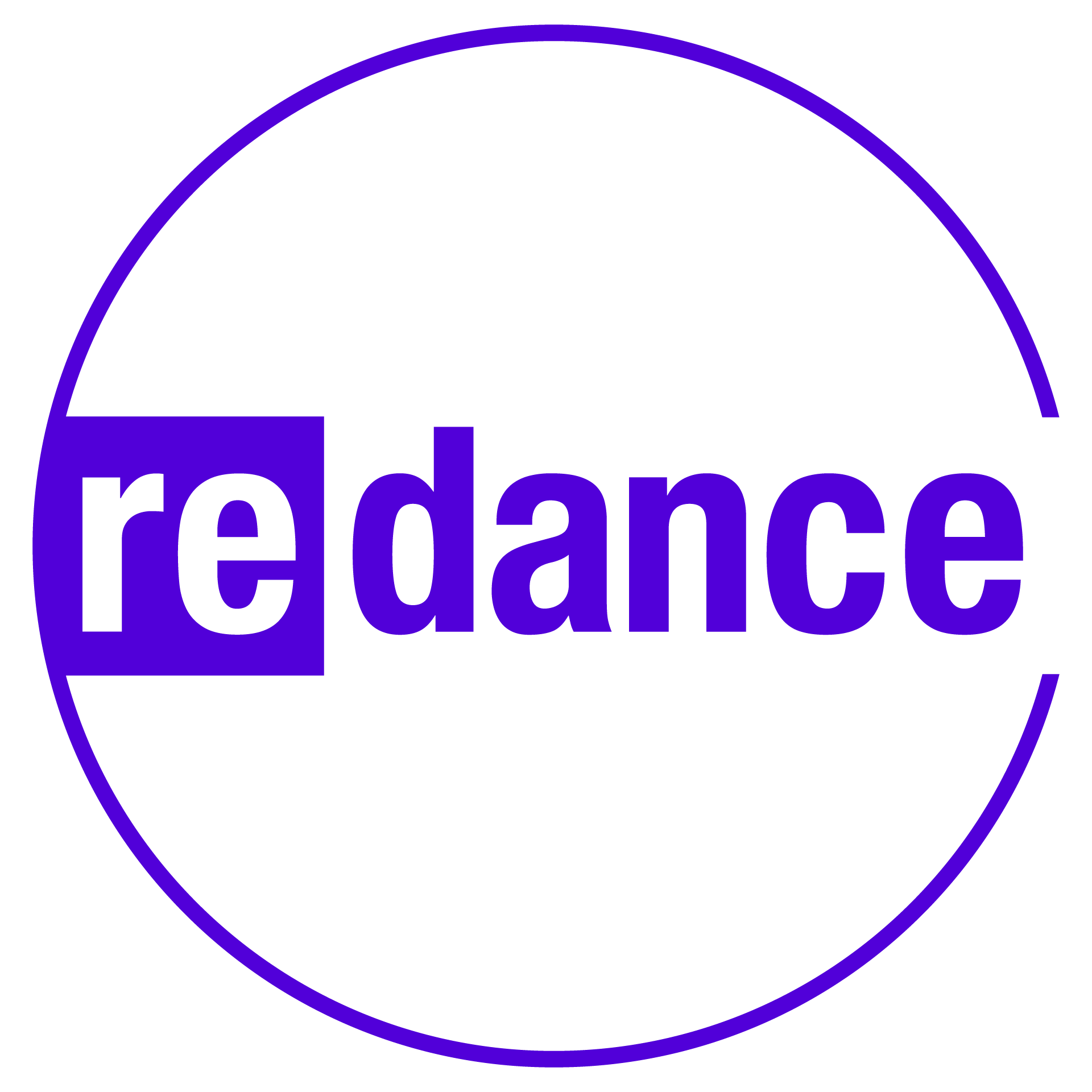It’s being softly resilient: Patscharaporn Krüger-Distakul
interviewed by Katelyn Skelley
Interview Date: 16.6.2021

Patscharaporn Krüger-Distakul Photo: c. Filip Piskorzynski
Patscharaporn Krüger-Distakul is a dancer, dance and yoga educator and mother based in Frankfurt am Main. She holds a BA in contemporary dance from Codarts, Rotterdam Dance Academy, the Netherlands. As a dancer she worked with the Tanz Luzerner Theater (Switzerland), Ballet Preljocaj (France), Compagnia Virgilio Sieni (Italy), Staatstheater am Gärtnerplatz (Germany) as well as in various freelance projects around Europe. She recently performed in a work by Yasmeen Godder in Frankfurt, currently collaborates with Paula Rosolen/ Haptic Hide in various projects and engages in continuous research within the frame of the re_dance platform. Besides dancing and performing she is pursuing a further education in cultural management. Patscha and I met for our first interview in August 2019 when her daughter Tāra was nine months old. She spoke about the process of taking on the new role of carer, finding sustainable methods of working and the wish for more opportunities for exchange on the topic of parenthood in the dance field. We caught up in June 2021 while Patscha was in the middle of an intensive rehearsal period to speak about the ways in which motherhood and the pandemic have informed her work, the support of skill sets built throughout her training and career and the experience of being an artist and mother in the Germany system.
Katelyn: Could you speak a bit about what you are currently busy with? In any aspect of your life, what is most present for you?
Patscha: I am currently busy with observing Tāra really becoming a papa’s girl. Last week I could feel that she was totally accepting just being with her father because I was not there from morning to evening. Coming back home in the evenings, not really being able to physically or even mentally be with her some days from tiredness. I can feel she was totally fine and asking for a lot of attention from her father. In the beginning of the week, I was dealing with the fact that I could not do enough for her. I think tiredness made me accept that this is a phase where she’s really bonding with her father again. And actually, I can just enjoy my time to completely dive into work.
Katelyn: What project are part of currently?
Patscha: I’ve been diving into learning and practicing the piece called Practicing Empathy by Yasmeen Godder. This piece was already created in Israel and two of the dancers from Israel came to us here and gave us the score. In a way it’s a very fixed score, but also very open because it is about meeting the moment and meeting the person in that moment in front of you. Or meeting yourself even through the other person in front of you. Yes, it’s very intense. And that was like every day. Like eight hours. Also, of course, I went in there with a lot of joy and excitement that this is maybe the first real project where we all work again together after the pandemic. Or after the lockdown. In the studio physically with new people, even international. So, I was excited about that.
Katelyn: How was that for you, in terms of how you felt in the studio? Can you speak a little more about that and then the whole process of going home and experiencing being a parent?
Patscha: I had days when I went to the studio quite late for my usual rhythm. I like to be in the studio way before rehearsal actually starts. I just didn’t manage because of some family stuff. But then really having to tell myself, ok, now you step into the studio, it’s for you. It’s also, a place to rest. To rest from some family issues. Of course, there was a part of me that was like, no, I didn’t finish up that family issue. Maybe I should have stayed longer at home to fix it. But a big part of me was like, this is also my right to come at this time for my work in the studio. To take that space of the studio as really refreshing and completely dive into something else. Dive into a big part of me that is usually not represented in daily life in the family. Yeah, that was beautiful, actually. I think it’s this type of work where I just get completely empty. A blank page. Entering the space of the halls of home again, not knowing the rhythm of my child. Kind of completely losing the track of the day of the family. 7:00 p.m. felt like it could go on for three hours, something like this, and usually, as a mother, I really look at the clock. It’s not persisting, like super control, but having a track of the day of my child as well. It was kind of new to come back home and not know at which state of the day my child was in.
Katelyn: How did you feel in your body through the whole week, physically? Were you ready to engage in this project?
Patscha: Yes, I was, actually. Just a week before, just out of the lockdown, I was sort of thrown in cold water on a tour to Sofia. We worked with 20 local dancers in a studio performing together. It was really extreme coming from zero from the lock down. 20 people felt really like 100 people. But I also felt that I took it in very quick, like we’re back. But then coming home and having time to digest that felt like it was a lot. Then I had a couple of days break and then went into to this very soft process of working 2by2 by Yasmeen Godder. We are a medium size group. We’re six to eight people always in the studio. The work is really facilitating this soft re-entering or restarting back again from the lock down. So, I appreciate it to actually take one step back and restart the restart after that lock down.
Katelyn: If you trace back to March 2020. This this whole Corona period thus far. Could you describe how this lockdown was for you?
Patscha: At the time of the first lock down, my biological timing and also that of my child was at a point where we both felt ready for me to go back to more work. That time last spring she was a bit over one year. Of course, before she turned one, I did small projects, but they were either not so intense or very short in time. But by the spring last year I felt that I could fully go back again. And from her side, she was becoming more independent. She got a spot in childcare, so I felt like I could start and then the lockdown came. So, looking back at it, I can appreciate the lockdown time because it was an extension of my motherhood leave. But at that time, I was like a bit like, let’s go.
Katelyn: Were there some advantages for you as a dancer and mother in this corona time?

Patscha Photo: C. Katerina Kruska
Patscha: As a mother, I didn’t miss much physical contact. This is really super plain and very simple, but I didn’t have the feeling that I missed physical contact with other human beings. Actually, it was really nice to actually have time to direct the physicality more towards the family. As a family we could take time to build a little castle and we enjoyed being in there for a long while. The lockdown stopped me from restarting immediately again. It also gave me a window of time to question where the dance community is now. How does it look like? How are the situations of my colleagues? What can bring us more together? How do I really want to restart entering into performing again? Also, really thinking about what aspects of dance I was missing before motherhood. That partly was an impetus to start re_dance.
Katelyn: Can you speak a little bit about what provoked re-dance? To really initiate it at that time.
Patscha: This whole corona lockdown in all aspects of life, for me came the question, how can we be more sustainable? This idea of sustainability transmitted over into how I wanted to approach performing again. But definitely sustainability was one of the words. Then also, knowing that for a while we will not be able to travel and work how we used to. So, the idea of first really getting to know the local scene and other people who were based here. Then realizing that there’s also a lot of potential to really question the art industry. That the industry is so based on having to be international. I was very much part of that and now I’m slowly getting back to being part of it more and more. Most of my colleagues and I aimed for going abroad a lot. And of course, with this lockdown, I knew it was not going to be possible. So, the question became, how can we make it happen here?
Katelyn: Do you feel now a wish to go back really international?
Patscha: The way I approach traveling for work is not the same anymore. Before the lockdown, before motherhood, I was sometimes intentionally looking for jobs abroad. Now I’m absolutely not doing that anymore. I’m working with local artists and then with the local artists going abroad. It’s very different when you go alone as a solo artist trying to get jobs abroad. In this way you have the feeling that you take people from the same city where you live and then represent the work created in our home city in other places. So, the emotionality of it is completely different. I would not say that I’m super hungry for work abroad. If it happens, I embrace it very much, but really more from the idea that I have created it here, and then bring it there.
Katelyn: What do you feel you have now to say as an artist? What are you excited about as you’re really engaging into your work?
Patscha: I’m very excited about slowly understanding what’s going on in this area where I’m living and working. About getting to know more and more people that I collaborate with on a professional level, but also on a personal level. In this field, it’s so hard to separate professional from the private, you know.
Katelyn: What is your wish, or some of your wishes for your career?
Patscha: One thing that is already starting is that I’m not just a dancer on stage. I really appreciate that. Because that was something happening to me before I took a little break from dance before I went into motherhood. I felt like it was not enough anymore for me to just be the dancer on stage and now I slowly see the shift. Performing the choreography, I feel that there’s more sharing from my side, and this is really my wish to continue more and more in this way. On a very personal aspect, I would say, I am biologically and physically at an age where I don’t necessarily have to perform physically the whole season anymore. So, I’d be happy performing part of the season and looking into the behind the scenes for the rest of the season. Administrative work. Management work. Right now, I’m trying to educate myself to have more tools to jump into these other roles. I also want to give my body rest sometimes. But my wish is really to try to keep the balance between being really physically back in the studio, like being barefoot in sports clothes and sometimes to actually not have to wear sports clothes. To wear nice shoes or nice clothes and just be there for the performance projects from the other end.
Katelyn: What does being a dancer mean to you right now?
Patscha: (pause) Being a dancer for me means to share through one of my instruments, which is the body. And also, through this instrument, also expressing or translating the mind and the emotions, the being. Connecting and engaging this instrument that I’ve trained my whole life to do this work, whether it’s sharing, communicating, creating and even researching through this instrument. I really believe that movement in general is a very universal language. As human beings we are dealing with our body as long as we are in this world. This is what I find very fascinating about dance and movement art. So, this is the reason why I’m still in there.
Katelyn: You mentioned different instruments that you’re considering, also as a dancer. Can you describe a bit more the other instruments that are also part of continuing your work?
Patscha: I think that there are other elements that make us up as human beings. So, being influenced by Yasmeens’s work right now, I’m dealing with the emotional body. And I remember there was a while in my life when I dealt more with the spiritual body. There are also periods coming up of being guided by the body of intelligence. Right now, these are how I see the different elements that make us up as humans. I’m very engaged in using the instrument, or being there as a human being, and expressing through the physical body and the emotional body in this work that I’m in now.
Katelyn: You mentioned maybe continuing with a further education and even making this big move to Berlin. Do you think that would be possible to move your family?

Patscha and Tāra Photo: C. Katerina Kruska
Patscha: I hope that there will be a time when my partner will be freer to work from somewhere other than on location. It’s something that he’s aware of. I think somehow it is his wish to be able to do that at some point. On the other hand, I know that in the life of my child, there will be a time when she’s way more independent than now. So even for me, if it will take another five, six years when she goes to school and has her own hobbies, that’s also fine. Before motherhood I was always someone who was impatient with things. If I knew I wanted something, I wanted to do it now. Motherhood has taught me to consider the timing of people that are very close to me that are relating to me. And actually, that’s a gift. At first, maybe I felt a bit, tightened up, but actually that’s really a gift because it also gives me time to reflect more about it as well. So, about starting a master’s program? It’s something there, I know.
Katelyn: Through all of this time, all of this process from giving birth until now and through the pandemic, do you feel that concretely, anything from your whole dance life has supported you in persevering?
Patscha: Yes, definitely. I think it’s a character trait of, not necessarily saying ‘never stop,’ but it’s about this re-finding thing. If you feel that you have re-found your need or urge to go back into dance, then make time for that. Also, this thing of going outward with that wish, has supported me. Because I think even before moving to Frankfurt, being in a really stable, fixed partnership and starting a family, I was always really outgoing with my wishes. What money I saved, whatever I earned all went into my dance workshops and traveling for dance. Communicating that into the universe. Now it’s simply meeting a person from an institution here or having a personal conversation with a choreographer. Just to really be able to say, yes, I want to be back in performing. This courage to express those wishes is something I learned through my studies and career. That probably grabbed me back after motherhood to perform again. Sometimes with those wishes, I felt like I don’t want to be too pushy. But on the other hand, sometimes we live in such different realities. And just thinking, what if the other person thinks they cannot ask me for a job because they think I might not be able to be away from my family for a while? That perhaps they did not ask because they were just being very careful. So, I have to say from my side that I’m at a time in my life and in my daughter’s life where I could be ready to do that. In a way, it’s a very soft, insisting, persistence. Also being resilient. This is something I’ve learned through dance training and also, of course, by going through receiving many, many no’s after many auditions. It’s being softly resilient, yeah. Also, this thing came up with re_dance. Sometimes I’m thinking, what is it? It’s also a form of softly expressing the resilience against this widely spread image that female dancers who became mothers either stop or transition into a non-performing field. So, persisting in that. It’s like no, we go back different.
Katelyn: Is there anything else that you’d like to add? Or that hasn’t been previously shared?
Patscha: Actually, back to your first question when you asked what I’m currently busy with. It’s not that current anymore but what I was very busy with during March, April was the role of being an artist and the role of being a mother in this society. Being here in Germany with the lockdown, things were brought to the surface and become much clearer. Being here and living here in the German funding system, we already know art functions through applications for funding from the government. It’s rarely private sponsoring. We’re already always the ones asking for money from the government all the time. That’s the tax money of other working people, also from us, from our own incomes, but also from the whole society here. So, you already feel a bit like you’re always the one asking for money. Then through the pandemic, through the lockdown, we have this huge lockdown and what became clear was the difference between the neighboring cities, Frankfurt and Offenbach. The childcare in Offenbach was only allowed for children from parents that are working in system relevant professions. There was no space for culture and arts people. So that brought to the surface that we’re really being labeled as non-system relevant. We kind of knew that before but now it’s very obvious. And being a mother, that’s also probably not seen as system relevant. It’s kind of a double labelling. How we are functioning and moving in Germany at this time is quite harsh, actually. I’m sure I’m not the only one feeling this way. I’m also thinking about other colleagues here that are mothers. I’m wondering how they felt and if they also had these thoughts. The lock down brought up this question of what privileged groups are, and not privileged groups. On the other hand, I had the privilege of working in a studio and not only being in home office. With a small group we were officially allowed to work in a physical space, which most of the other professions were not allowed to. So, this was another thing that I dealt with a couple of months ago.
Katelyn: Did you come to any resolution or did anything make you feel better about that?
Patscha: It’s not so clear and I’m not going too deep into politics for myself. But maybe it’s a strategy for the German government to seem that they are culturally friendly. Right now, there is so much funding, again, open for culture. Many programs and many open positions for jobs that are related to culture. Because for once, there is all this money for culture that got freed up since the pandemic started. I wonder how we are going to end up in a couple of years. I just don’t know where this money came from that wasn’t there before. But I’m just trying to enjoy it right now. Enjoy that it seems as though they want to open up new possibilities for us artists. Or make us continue to work. It can be a plus. But also, I think each of us should be really careful when our from the heart, very personal art gets too much into a form of a capitalistic thing. Speaking for myself, I have to be very, very aware of what projects are more of an economical thing and what projects are really, like, my project. It’s always a really fine line, being active in the art field, I think.
Katelyn: And on that note, thank you so much for this interview.
Patscha: Yes, thank you.



Gefördert durch die Beauftragte der Bundesregierung für Kultur und Medien im Programm NEUSTART KULTUR, Hilfsprogramm DIS-TANZEN des Dachverband Tanz Deutschland.
